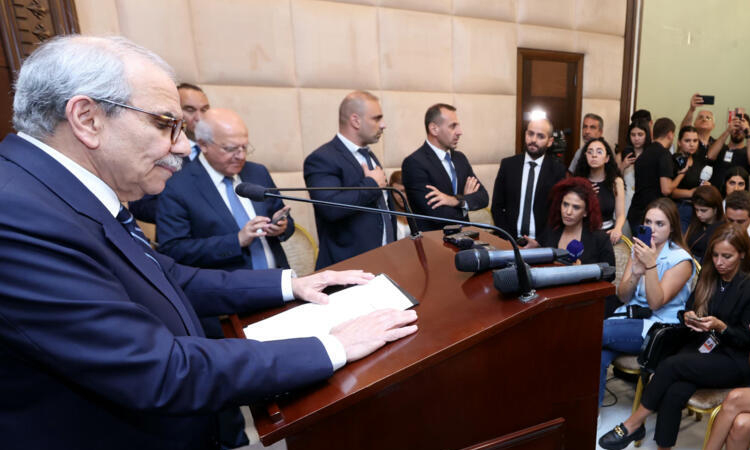News Flash

BEIRUT, Lebanon, Aug 7, 2025 (BSS/AFP) - Hezbollah said Wednesday that it
would treat a Lebanese government decision to disarm the militant group "as
if it did not exist", accusing the cabinet of committing a "grave sin".
Amid heavy US pressure and fears Israel could expand its strikes on Lebanon,
Prime Minister Nawaf Salam said Tuesday that the government had tasked the
army with developing a plan to restrict weapons to government forces by year
end.
The plan is to be presented to the government by the end of August for
discussion and approval, and another cabinet meeting is scheduled for
Thursday to continue the talks, including on a US-proposed timetable for
disarmament.
Hezbollah said the government had "committed a grave sin by taking the
decision to disarm Lebanon of its weapons to resist the Israeli enemy".
The decision is unprecedented since Lebanon's civil war factions gave up
their weapons three and a half decades ago.
"This decision undermines Lebanon's sovereignty and gives Israel a free hand
to tamper with its security, geography, politics and future existence...
Therefore, we will treat this decision as if it does not exist," the Iran-
backed group said in a statement.
- 'Serves Israel's interests' -
The government said its decision came as part of implementing a November
ceasefire that sought to end more than a year of hostilities between Israel
and Hezbollah, which culminated in two months of full-blown war.
Hezbollah said it viewed the government's move as "the result of dictates
from US envoy" Tom Barrack.
It "fully serves Israel's interests and leaves Lebanon exposed to the Israeli
enemy without any deterrence", the group said.
Hezbollah was the only faction that kept its weapons after Lebanon's 1975-
1990 civil war.
It emerged weakened politically and militarily from its latest conflict with
Israel, its arsenal pummelled and its senior leadership decimated.
Israel has kept up its strikes on Hezbollah and other targets despite the
November truce, and has threatened to keep doing so until the group has been
disarmed.
An Israeli strike on the southern town of Tulin on Wednesday killed one
person and wounded another, the health ministry said.
Israel also launched a series of air strikes on southern Lebanon, wounding at
least two people according to the health ministry.
The Israeli military said it struck "weapons storage facilities, a missile
launcher and Hezbollah terrorist infrastructure which stored engineering
tools that allowed for the re-establishment of terrorist infrastructure in
the area".
Hezbollah said Israel must halt the attacks before any domestic debate about
its weapons and a new defence strategy could begin.
- 'Pivotal moment' -
"We are open to dialogue, ending the Israeli aggression against Lebanon,
liberating its land, releasing prisoners, working to build the state, and
rebuilding what was destroyed by the brutal aggression," the group said.
Hezbollah is "prepared to discuss a national security strategy", but not
under Israeli fire, it added.
Two ministers affiliated with Hezbollah and its ally the Amal movement walked
out of Tuesday's meeting.
Hezbollah described the walkout as "an expression of rejection" of the
government's "decision to subject Lebanon to American tutelage and Israeli
occupation".
The Amal movement, headed by parliament speaker Nabih Berri, accused the
government of "rushing to offer more gratuitous concessions" to Israel when
it should have sought to end the ongoing attacks.
It called Thursday's cabinet meeting "an opportunity for correction".
Hezbollah opponent the Lebanese Forces, one of the country's two main
Christian parties, said the cabinet's decision to disarm the militant group
was "a pivotal moment in Lebanon's modern history -- a long-overdue step
toward restoring full state authority and sovereignty".
The Free Patriotic Movement, the other major Christian party and a former
ally of Hezbollah, said it was in favour of the army receiving the group's
weapons "to strengthen Lebanon's defensive power".
Iran's Foreign Minister Abbas Araghchi said in a televised interview that any
decision on disarmament "will ultimately rest with Hezbollah itself".
"We support it from afar, but we do not intervene in its decisions," he
added, noting that the group had "rebuilt itself" following setbacks during
its war with Israel.